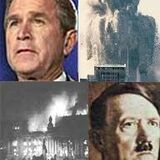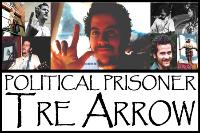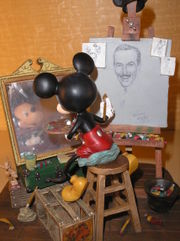Friday, September 14
UnCurious George: Harvard's "Up Your New England Nose" Outcast
"I remember seeing Georgie at the Harvard Business School but he looked so lost and forlorn I didn't have the heart to say hello."-- Torbert MacDonald, Harvard classmate of George W. Bush
 An inveterate chronicler of Hollywood schlock, author Kitty Kelly has made $millions$ from feeding the American sheeple's addiction to celebrity weirdness, kinkiness and perversity. Kelly, a doyenne in New York publishing circles, is celebrated for bestselling paperbacks on Jackie Kennedy-Onassis, Elizabeth Taylor, Frank Sanatra, Nancy Reagan and inbred British royals--which, interestingly, isn't sold in the UK.
An inveterate chronicler of Hollywood schlock, author Kitty Kelly has made $millions$ from feeding the American sheeple's addiction to celebrity weirdness, kinkiness and perversity. Kelly, a doyenne in New York publishing circles, is celebrated for bestselling paperbacks on Jackie Kennedy-Onassis, Elizabeth Taylor, Frank Sanatra, Nancy Reagan and inbred British royals--which, interestingly, isn't sold in the UK.
Then in 2004 Kelly's taste in pop icons inexplicably tilted toward the politically perverse and kinky, though she, without question, chose America's foremost post-World War II power-hungry (and secretive) agent-proxies for U.S. elite bluenose families. In The Family: The Real Story of the Bush Dynasty (2005, Random House, pp. 737), Kelly peeks past the Bushes' finely honed public mythology to take an unflinching look at some of their skeletons long padlocked in the clans' mausoleum.
Though "the darling of the American Bar Association" (p. xix) since the 1980s for myriad lawsuits that her "unauthorized" biographies of the living has spawned, Kelly reports her four-year efforts at sorting out Bush myths from reality transported her to even more threatening terrain. In the "Author's Note," she confirms troubling concerns of some of her sources.
Harvard's Smokeless Tobacco "Rebel"
After Georgie went AWOL from the Texas Air National Guard, he resurfaced in 1975 to begin a painful tenure at Harvard Business School in 1975; Kelly's details this period in George II's life in The Family.
 An inveterate chronicler of Hollywood schlock, author Kitty Kelly has made $millions$ from feeding the American sheeple's addiction to celebrity weirdness, kinkiness and perversity. Kelly, a doyenne in New York publishing circles, is celebrated for bestselling paperbacks on Jackie Kennedy-Onassis, Elizabeth Taylor, Frank Sanatra, Nancy Reagan and inbred British royals--which, interestingly, isn't sold in the UK.
An inveterate chronicler of Hollywood schlock, author Kitty Kelly has made $millions$ from feeding the American sheeple's addiction to celebrity weirdness, kinkiness and perversity. Kelly, a doyenne in New York publishing circles, is celebrated for bestselling paperbacks on Jackie Kennedy-Onassis, Elizabeth Taylor, Frank Sanatra, Nancy Reagan and inbred British royals--which, interestingly, isn't sold in the UK.Then in 2004 Kelly's taste in pop icons inexplicably tilted toward the politically perverse and kinky, though she, without question, chose America's foremost post-World War II power-hungry (and secretive) agent-proxies for U.S. elite bluenose families. In The Family: The Real Story of the Bush Dynasty (2005, Random House, pp. 737), Kelly peeks past the Bushes' finely honed public mythology to take an unflinching look at some of their skeletons long padlocked in the clans' mausoleum.
Though "the darling of the American Bar Association" (p. xix) since the 1980s for myriad lawsuits that her "unauthorized" biographies of the living has spawned, Kelly reports her four-year efforts at sorting out Bush myths from reality transported her to even more threatening terrain. In the "Author's Note," she confirms troubling concerns of some of her sources.
With every book I've written, I've encountered a certain amount of hesitancy on the part of potential sources, because they are understandably reluctant to talk about powerful people, either for fear of retribution or for fear of being socially ostracized. The amount of trepidation I encountered in writing this book was unprecedented, but perhaps that's what comes from writing about a sitting President whose family has a long reach....Many sources were reluctant to tell their stories on the record, and much as I dislike using unnamed sources, in some cases I had no choice. Many people who know the Bushes--friends, former employees, classmates, business associates, and even a few family members--were skittish about speaking for attribution. I heard an endless stream of excuses and apologies, some comical, others disconcerting. 'You don't know that family...If they think I've talked to you, they'll never speak to me again." "This town is too small to rile the Bushes." "I want to live to see my grandchildren." One man said, "You can't use my name. They'll come after me. The Bushes are thugs." (p. xx)Kelly further claimed Bush Sr. "did all he could to close every door I opened" (p. xxi), citing as reasons (1) the former president's empathetic affront at Nancy Reagan's anger at the author's biographical characterization of her and (2) Bush's own 25 July 1991 vacuously self-serving entry in All the Best, George Bush: My Life in Letters and Other Writings:
Have you ever had one of of those days when it just isn't too good...Just one of those days when you want to say forget it. Oh, yes, the President of Paramount that owns one of the big book companies called in to say that Kitty Kelly wants to write a book either about the Bushes or the Royals and he turned it down. That's nice--a book by Kitty Kelly with everything else I've got on my mind...I can't see her ever writing anything nice.What Poppy Bush was alluding to at the time by "everything else...on my mind" was his p.r.-contrived "desert holocaust" in Iraq, an documented slaughter of innocents replete with war crimes and crimes against humanity. But a competitive impulse shared among Bush alpha males that Kelly documents in The Family inclined Prez George Jr. a dozen years later contrived new barbarisms for a still suffering Iraqi populace.
Harvard's Smokeless Tobacco "Rebel"
After Georgie went AWOL from the Texas Air National Guard, he resurfaced in 1975 to begin a painful tenure at Harvard Business School in 1975; Kelly's details this period in George II's life in The Family.
When George arrived at Harvard to join the class of 1975, his father was running the Republican National Committee for Richard Nixon at the height of Watergate. George, who espoused this father's politics, found himself in a hostile political environment where Nixon was considered the Antichrist.
"Cambridge was a miserable place then to be a Republican," recalled George's aunt Nan Bush Ellis, who lived in Massachusetts, a state known as a Democratic stronghold. In the environs of the town that surrounded Harvard, only four hundred people were registered Republicans, George spend many weekends with his aunt and her family outside of Boston, lambasting Harvard's "smug guilt-ridden affected liberals."
"I remember seeing Georgie at the Harvard Business School," Torbert Macdonald, his classmate from Andover, "but he looked so lost and forlon I didn't have the heart to say hello."
Most of the class of 1975 at the B-school knew they were headed for Wall Street, but not George. "He was trying to figure out what to do with his life," said his classmate Al Hubbard. "He was there to get prepared, but he didn't know for what."
Other classmates were not quite as generous in assessing George's attitude. "He was remarkably inarticulate," said Steve Arbeit. "God, so inarticulate if was frightening. The reason I say that he is dumber than dumb is not that I saw his test scores of his grades' it's the comments he made in the classes we had together that scared me...He was totally unimpressive in an atmosphere where you were judged completely on your class participation.
"There's always a layer of kids who are in the school because their parents are somebody. It's almost a legacy sort of thing. Most of them acted like everybody else, except for George, who would not say hello to someone like me if we passed in the hall...I'm not the same social class. My father is not chairman of something...So unlike most of the people who try to pretend you-don't-know-who-my-dad-is type of thing, George was the opposite."
Ruth Owades, chairman of Calyx and Corolla, a flower catalog company, and a member of George's class, remembered people pointing him out. "At a place like Harvard Business School, you always knew who the sons or daughters of famous people were--but mostly the sons. And then these were the rest of us."
Alf Nucifora, another classmate, recalled George as a "nonentity with a rich boy's attitude who obviously got into school because of the divine right of kings...You did not see a great future for this man. There's no way that any sane individual could ever have made such a prediction."
During his first year George came to the attention of Yoski Tsunumi when the macroeconomics professor announced his plan to show the film The Grapes of Wrath, based on John Steinbecks's book about the poverty and a sense of historical empathy," Tsurumi explained. "George Bush came up to me and said, 'Why are you going to show us that Commie movie?'
"I laughed because I thought he was kidding, but he wasn't. After we viewed the film, I called on him to discuss the Depression and how he thought it affected people. He said, "Look. People are poor because they are lazy.' A number of the students pounced on him and demanded that he support his statement with facts and statistics. He quickly backed down because he could not sustain his broadside."
Professor Tsurumi continued: "His strong prejudices soon set him apart from the rest of the students. This has nothing to do with politics, because most business students are conservative, but they are not inhumane or unprincipled. Unlike most of the others in class, George Bush came across as totally lacking compassion, with no sense of history, completely devoid of social responsibility, and unconcerned with the welfare of others. Even among Republicans his kind was rare. He had no shame about his views, and that's when the rest of the class started treating him like a clown--not someone funny, but someone whose views ere not worthy of consideration...I did not judge him to be stupid, just spoiled and undisciplined...I gave him a 'low pass.' Of the one hundred students in that class, George Bush was in the bottom 10 percent. He was so abysmal that I once asked him how he ever got accepted in the first place. He said, 'I had lots of help.' I laughed, and then inquired about his military service. He said he had been in the Texas National Guard. I said he was very lucky not to have had to go to Vietnam. He said, 'My dad fixed it so that I got into the Guard. I got an early discharge to come here'."
From the eight hundred people in the class of 1975, George stood out, and not because of who his father was. "I don't remember if he was one of the Texans who had Aggie horns on the front of his big American-made car--most of them did--but I can still see him in his cowboy boots and leather flight jacket walking into macroeconomics," recalled one classmate. "He sat in the back of the class, chewing tobacco and spitting it into a dirty paper cup...He was one red-assed Texan who made sure he was in your Yankee face and up your New England nose." (pp. 307-310)











